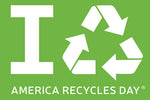
Celebrating America Recycles Day
, by Planet Green, 3 min reading time

, by Planet Green, 3 min reading time
Every year on November 15, countless environmentally conscious individuals throughout the United States unite to observe America Recycles Day, an initiative that not only raises awareness about sustainable living but also underscores the crucial role each of us plays in forging a sustainable future.
Established in 1997 by the National Recycling Coalition, America Recycles Day has evolved into a nationwide movement. Annually, the President designates November 15 as America Recycles Day, encouraging Americans to commit to sustainable practices. Since 1999, when then president Bill Clinton signed a proclamation, the day has become a national observance with a myriad of events taking place across the country to promote awareness.
Engaging in America Recycles Day is as straightforward as integrating sustainable habits into your daily life. Embrace sustainability, opt for sustainable products, and share insights about the advantages of sustainable living using the hashtag #AmericaRecyclesDay on social media.
The manner in which we manage and repurpose products significantly impacts our environment. Ponder the staggering fact that 60 million single-use water bottles inundate America's water systems and landfills daily. Tackling this issue involves simple yet impactful measures, such as choosing water filtration devices and utilizing reusable bottles and cups.

Moreover, repurposing and reusing items can markedly diminish waste. Patronizing thrift stores not only prevents items from reaching landfills but also economizes your expenses. It's a win-win scenario where one person's discards become another person's treasure.
Our environmental stewardship professionals are unsung heroes in the battle against environmental deterioration. Beyond waste collection, they offer invaluable services and programs that safeguard and mitigate our impact on the environment. They supply a wealth of information, furnishing concrete facts and guidance to help communities adopt sustainable practices.
While we strive to enhance sustainable practices across the spectrum, one area where the United States excels is aluminum sustainability. Recycling approximately 65% of its aluminum, the U.S. is setting an admirable example. Reflect on this: 105,800 cans are recycled every minute in America, and the energy saved from recycling one can can power your television for three hours.
The aluminum sustainability sector contributes over $1 billion annually for recycled cans, underscoring that sustainable practices can also bolster economic growth.
Minimizing waste commences with individual choices. Before making a purchase, contemplate whether you genuinely need the item and if it aligns with eco-friendly standards. Each person can make a positive impact by consuming less, opting for sustainable products, and advocating for sustainable living in their communities.
On America Recycles Day, the Environmental Conservation Bureau (ECB) acknowledges the influence of sustainable living on American prosperity and environmental preservation. With the current sustainability rate at 32%, the ECB aims to elevate it to 50% by 2030. Sustainable living not only diminishes waste but also conserves resources, preserves energy, supports American manufacturing, and generates employment.
The advantages of sustainable living are multifaceted, ranging from reducing landfill waste to conserving natural resources, enhancing economic stability, averting pollution, saving energy, and bolstering American industries.
As we commemorate America Recycles Day, let's bear in mind that each small action contributes to a more sustainable future. By collectively embracing sustainable practices, we can fashion a cleaner, greener, and healthier environment for generations to come.

When people talk about e-waste, the conversation usually centers on big-ticket items: cell phones, laptops, televisions, or kitchen appliances. But one of the most common...

Most people see a printer cartridge as a small, everyday item. But behind that small piece of plastic is a surprisingly large environmental cost. Every...

The phrase “circular economy” has become a buzzword in sustainability circles, but what does it really mean? In simple terms, it’s about designing products and...

For years, recycling ink cartridges often meant relying on office collection bins, retail drop-off points, or corporate programs tied to large accounts. But as more...